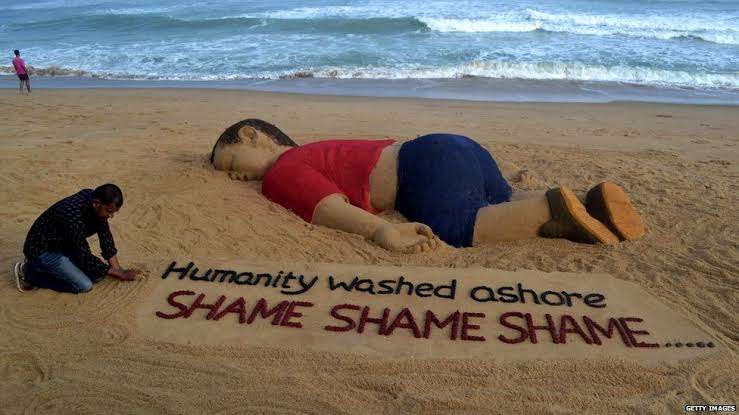In the early morning hours of September 2, 2015, the body of a 3-year-old Syrian boy named Alan Kurdi washed up on the shore of a beach in Bodrum, Turkey. He was face down in the sand, wearing a red T-shirt, blue shorts, and little shoes — an image so stark and powerful it shook the world’s conscience.
The Journey That Ended in Tragedy
Alan was born in Kobani, Syria — a city ravaged by the war between ISIS and Kurdish forces. His family, like millions of others, fled the brutal Syrian civil war that had already claimed hundreds of thousands of lives. They sought safety and a better future, ultimately hoping to reach Canada, where some relatives were already living.
Alan’s father, Abdullah Kurdi, tried multiple times to find a legal and safe passage out of Syria and Turkey. However, like many refugees, the family was met with closed doors and bureaucratic obstacles. With no other choice, they decided to cross the Aegean Sea to Greece in a small inflatable boat — an extremely dangerous journey often organized by human smugglers.

Onboard were Alan, his 5-year-old brother Ghalib, his mother Rehanna, and other refugees. The boat, overcrowded and unstable, capsized shortly after setting off in the dark. Alan, Ghalib, and Rehanna drowned. Only Abdullah survived.
The Photo That Stopped the World
A Turkish journalist captured a photograph of Alan’s lifeless body in the sand. The image quickly spread across international news and social media. Unlike most stories, it transcended borders, politics, and language. It humanized the refugee crisis in a way statistics never could.
People who had ignored the crisis suddenly paid attention. Leaders were moved to speak. Governments were pushed to act. Protests and vigils were held across Europe. The photo became a heartbreaking symbol of innocence lost to war and inaction.
The Aftermath
Alan’s family hoped for safety, like any parent would for their child. The tragedy ignited debates about immigration policies, international responsibility, and the moral obligation of wealthier nations toward refugees. But as time passed, the initial surge of compassion and urgency faded, even though the crisis continued.
Abdullah Kurdi, Alan’s father, later returned to Syria to bury his wife and children. He said he wanted the world to remember that his children “slipped through the fingers of humanity.”
Why Alan’s Story Still Matters
Alan Kurdi’s death wasn’t an isolated tragedy — it was one of thousands. But it became a symbol because the world saw in him what it had refused to see before: a child, not a number; a person, not a policy problem. His story forced people to ask, What kind of world lets a child die like this?
To this day, Alan’s story is remembered as a turning point in how the world viewed the Syrian refugee crisis — not as a political inconvenience, but as a human emergency.
-Deeprows Real Stories
Featured image credit: Getty Images

